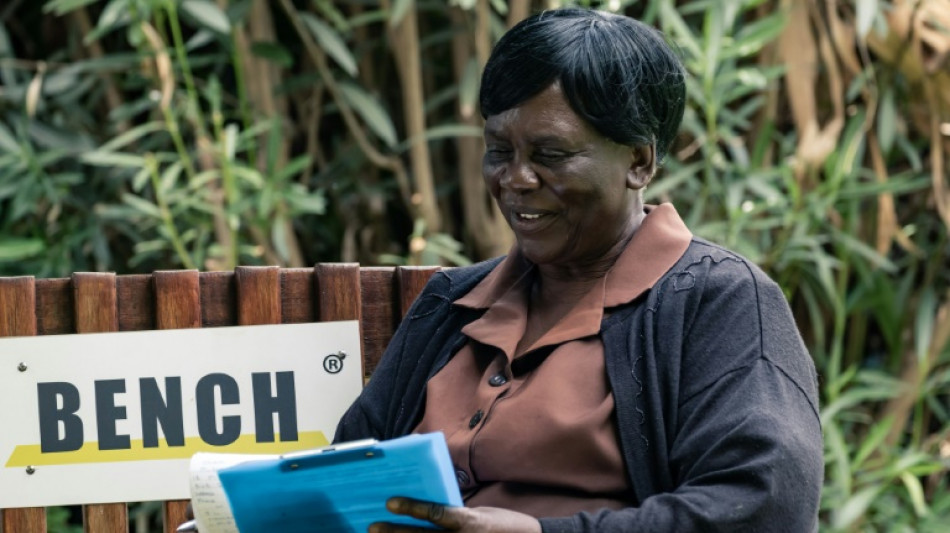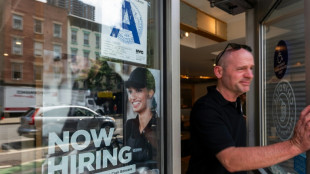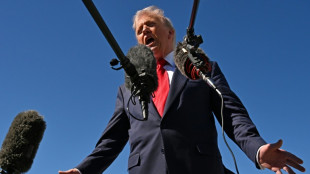
-
 Spain's exiled king recounts history, scandals in wistful memoir
Spain's exiled king recounts history, scandals in wistful memoir
-
Wall Street stocks steady after positive jobs data

-
 Trump blasts Democrats as government shutdown becomes longest ever
Trump blasts Democrats as government shutdown becomes longest ever
-
Indian pilgrims find 'warm welcome' in Pakistan despite tensions

-
 Inter and AC Milan complete purchase of San Siro
Inter and AC Milan complete purchase of San Siro
-
Swedish authorities inspect worksite conditions at steel startup Stegra

-
 Keys withdraws from WTA Finals with illness
Keys withdraws from WTA Finals with illness
-
Prince Harry says proud to be British despite new life in US

-
 EU strikes last-ditch deal on climate targets as COP30 looms
EU strikes last-ditch deal on climate targets as COP30 looms
-
Stocks retreat as tech bubble fears grow

-
 Shein opens first permanent store amid heavy police presence
Shein opens first permanent store amid heavy police presence
-
West Indies edge New Zealand despite Santner brilliance

-
 French pair released by Iran await return home
French pair released by Iran await return home
-
German factory orders up but outlook still muted

-
 Death toll tops 100 as Philippines digs out after typhoon
Death toll tops 100 as Philippines digs out after typhoon
-
Attack on key city in Sudan's Kordofan region kills 40: UN

-
 'No one could stop it': Sudanese describe mass rapes while fleeing El-Fasher
'No one could stop it': Sudanese describe mass rapes while fleeing El-Fasher
-
Champagne and cheers across New York as Mamdani soars to victory

-
 Medieval tower collapse adds to Italy's workplace toll
Medieval tower collapse adds to Italy's workplace toll
-
BMW boosts profitability despite China, tariff woes

-
 South Africa's Wiese wary of 'hurt' France before re-match
South Africa's Wiese wary of 'hurt' France before re-match
-
Beyond limits: Croatian freediver's breathtaking record

-
 Tottenham supporting Udogie after alleged gun threat in London
Tottenham supporting Udogie after alleged gun threat in London
-
Thunder roll Clippers to stay unbeaten as SGA keeps streak alive

-
 In appeal, Australian mushroom murderer alleges 'miscarriage of justice'
In appeal, Australian mushroom murderer alleges 'miscarriage of justice'
-
Toyota hikes profit forecasts 'despite US tariffs'

-
 Ex-France lock Willemse challenges Meafou to become 'the bully'
Ex-France lock Willemse challenges Meafou to become 'the bully'
-
Ukrainians to honour sporting dead by building country they 'died for': minister

-
 At least 7 dead after UPS cargo plane crashes near Louisville airport
At least 7 dead after UPS cargo plane crashes near Louisville airport
-
US Supreme Court hears challenge to Trump tariff powers

-
 US government shutdown becomes longest in history
US government shutdown becomes longest in history
-
India's Modi readies bellwether poll in poorest state

-
 Green goals versus growth needs: India's climate scorecard
Green goals versus growth needs: India's climate scorecard
-
Where things stand on China-US trade after Trump and Xi talk

-
 Sri Lanka targets big fish in anti-corruption push
Sri Lanka targets big fish in anti-corruption push
-
NY elects leftist mayor on big election night for Democrats

-
 Injured Jordie Barrett to miss rest of All Blacks tour
Injured Jordie Barrett to miss rest of All Blacks tour
-
Asian markets tumble as tech bubble fears grow

-
 Pay to protect: Brazil pitches new forest fund at COP30
Pay to protect: Brazil pitches new forest fund at COP30
-
Iraq's social media mercenaries dying for Russia

-
 Young leftist Trump foe elected New York mayor
Young leftist Trump foe elected New York mayor
-
Concerns at ILO over expected appointment of close Trump advisor

-
 Venus Williams to return to Auckland Classic at the age of 45
Venus Williams to return to Auckland Classic at the age of 45
-
No deal yet on EU climate targets as COP30 looms

-
 Typhoon death toll climbs to 66 in the Philippines
Typhoon death toll climbs to 66 in the Philippines
-
NATO tests war preparedness on eastern flank facing Russia

-
 Uncapped opener Weatherald in Australia squad for first Ashes Test
Uncapped opener Weatherald in Australia squad for first Ashes Test
-
Liverpool down Real Madrid in Champions League, Bayern edge PSG

-
 Van Dijk tells Liverpool to keep calm and follow Arsenal's lead
Van Dijk tells Liverpool to keep calm and follow Arsenal's lead
-
PSG left to sweat on injuries to Dembele and Hakimi


Zimbabwe's 'mental health benches' exported to the World Cup
Sitting next to a patient with depression on a garden bench in Zimbabwe's capital Harare, 70-year-old Shery Ziwakayi speaks gently, offering accessible therapy with a warm and reassuring smile.
"You have made the right decision to come to see mbuya", she tells her client, using the Shona word for "grandmother" and offering a handshake.
A Zimbabwean doctor has come up with a novel way of providing desperately needed mental health therapy for his poorer compatriots by using lay health workers, colloquially referred to as "grandmothers".
Psychiatry professor Dixon Chibanda's concept is simple: a wooden park bench where people experiencing common mental disorders sit and receive free therapy.
Chibanda's Friendship Bench has proved popular and offered much-needed, accessible therapy.
Decades of economic hardships and deepening poverty have taken a mental toll on many Zimbabweans, imposing a huge burden on underfunded and understaffed psychiatric health services.
The Friendship Bench has helped bridge a shortage of professional healthcare workers in Zimbabwe -- which has only 14 psychiatrists, 150 clinical psychologists and less than 500 psychiatric nurses serving a population of 16 million people.
"We need these alternative innovations to narrow the gap and my idea is to use grandmothers to provide therapy," said Chibanda, wearing dreadlocks and round-framed spectacles.
The benches are spaces "to share stories and through storytelling we can all be healed," he said.
- World Cup and WHO praise -
His therapy model is now being exported to the football World Cup in Qatar, where 32 benches -- each representing a team competing in the FIFA tournament -- will be set up to cast the spotlight on global mental health.
The World Cup project is in partnership with the World Health Organisation (WHO), whose chief Tedros Adhanom Ghebreyesus has praised the initiative as "a simple yet powerful vehicle for promoting mental health".
It is "a reminder of how a simple act of sitting down to talk can make a huge difference to mental health," Tedros said recently.
Other countries to have adopted the friendship bench model include Jordan, Kenya, Malawi, Zanzibar and the US -- where 60,000 people in the Bronx and Harlem areas have accessed the therapy.
In Zimbabwe, about 70 percent of the population live below the poverty threshold.
Chibanda's idea of friendship benches germinated after a patient he was treating at a government hospital took her life.
"She didn't have $15 bus fare to come to the hospital to receive treatment for the depression," he said.
"That was the initial trigger that instantly made me realise that there was need to take mental health from the hospitals into the communities."
- 'A masterstroke' -
Grandmother Ziwakayi has offered therapy from the benches for the past six years, seeing an average of three clients a day.
"Through talking to us many have recovered and are leading normal lives again," said Ziwakayi, who received training in basic counselling skills, mental health literacy and problem solving therapy.
The grandmas are given a stipend for their services, and the operation is financed by Chibanda's NGO the Friendship Bench.
Her patients come from all walks of life -- young, old, suffering from stress or dealing with drug addiction. Some are unemployed or in financial trouble, others are gender-based violence victims.
On a white sheet clipped to a blue handheld board, she asks clients if they are frightened by trivial things; feel run down, or have felt like taking their lives, among a host of other questions.
Choice Jiya, 43, said she owes her life to the service offered on the benches, having considered suicide when her husband lost his job shortly after she gave birth to their twins in 2005.
"Before I went to the bench for therapy, I thought killing myself was a solution," she said.
She now operates a small business making perfumes and soap.
From just 14 grandmothers in Mbare -- Zimbabwe's oldest and poorest township -- at the start in 2006, there are now nearly 1,000 benches and over 1,500 grandmothers in different localities.
They have assisted 160,000 people in the last two years alone.
The fall-out from the Covid pandemic has seen a spike in mental health problems and the WHO estimates that more than 300 million people across the globe suffer from depression.
Its most recent report "paints a very bleak picture", showing six out of 10 countries with the highest suicide rates in the world are in Africa, said Chibanda.
For Harare's Health Services director Prosper Chonzi, the benches are a "masterstroke".
"Demand for mental health services is high due to the economic situation. This is one of the best interventions.
"It has made a huge difference in terms of averting suicides," he said.
H.Seidel--BTB




